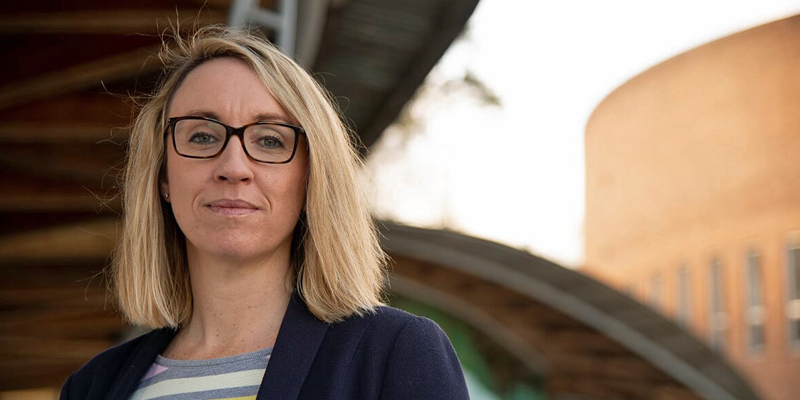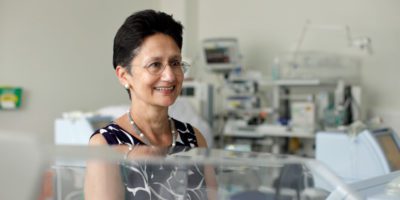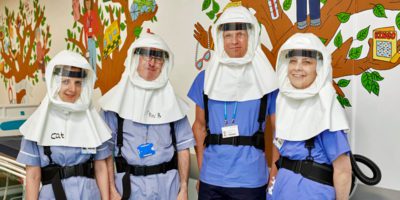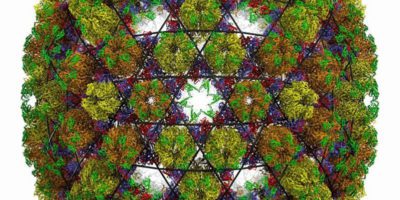Dr Olivia Champion founded Exeter-based BioSystems Technology in 2015 and Entec Nutrition in 2018. During her career, Dr Champion has published over 25 peer-reviewed research articles cited over 1500 times, six book chapters and filed four patents. She has been recognised by the SET Squared business incubator as a leading UK entrepreneur in her field and has given a TedX talk.
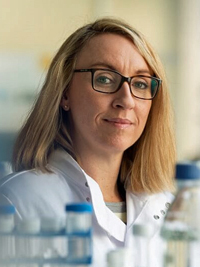
“Of the 131 spinout companies incorporated in 2015 and 2016 (BioSystems Technology was incorporated in 2015), only 20 founders or co- founders were female and only seven women held the position of CEO in the spin out companies. It turns out that I am a rare specimen!”
Since I last spoke with Womanthology
Since we last spoke back in 2016, my company, BioSystems Technology, has won an Exeter Living award for Technology and Innovation and I was selected as a top entrepreneur chosen by SET Squared, the global number one business incubator, an award that I received at an event in the House of Commons.
I have also given a TedX talk, which I loved. I’ve given a lot of scientific talks but crafting a TedX talk is a completely different experience, focussed on getting an idea from the mind of the speaker into the minds of the members of the audience.
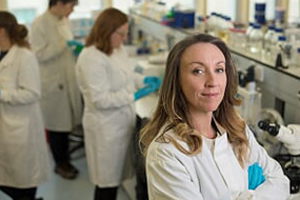
Background to BioSystems and how it got started
BioSystems Technology sells insect research models called TruLarv™ and ProLarv™ that can be used to reduce the number of animals, such as mice and rabbits, used for scientific testing.
TruLarv™ can be used to identify novel antimicrobials, test for toxicity and to understand the pathogenesis of a wide range of important bacterial and fungal pathogens. ProLarv™ can be used for microbiota, probiotic and prebiotic research.
Both the models are larvae of the Greater wax moth, Galleria mellonella, that have been produced in a standardised way so that they provide reproducible results.
Insects have many uses and aside from their use as a model host, they can also provide a sustainable source of ingredients for the food and feed industry. To produce the equivalent edible weight of insects, compared with animal meat such as beef, far less water and land is used as insects can be vertically farmed.
Insect farming also produces far less greenhouse gases. Insects are part of the solution to the UK achieving its net zero carbon target by 2050.
Although incorporated in 2015, BioSystems Technology really got started in 2016 when we won seed investment which was instrumental in my transition from academia to business.
From the beginning, I was conscious that a company can only survive long term if it can generate sales revenue and so building sales was, and remains, a key focus. To this end, since 2016 I have presented the research applications of one of my products, TruLarv™, at many international meetings and conferences in Spain, Switzerland, Poland, Greece, The Netherlands and Austria to name a few.
It’s always fascinating to learn about other scientists work and to understand how my products could be used to increase the efficiency of their experiments, so it’s very satisfying when a scientist adopts them as a research model and their work goes on to be published in the scientific literature.
The pandemic
COVID-19 has had a major impact on BioSystems Technology: the company has always operated from the University of Exeter laboratories and so when lockdown happened, the university closed its doors and the company was unable to carry out business operations for three months.
During lockdown, we have moved into a new office and we are in the process of kitting out our laboratory. It’s an exciting yet daunting move for us as a company, but we have been really encouraged by our customers who have waited patiently for us to reopen.
The barriers faced by female academics from launching companies
Of the 131 spinout companies incorporated in 2015 and 2016 (BioSystems Technology was incorporated in 2015), only 20 founders or co-founders were female and only seven women held the position of CEO in the spin-out companies. It turns out that I am a rare specimen!
My business experience includes developing intellectual property (IP), patent filing and strategy (I am a named inventor on several patents), pitching for private investment and commercialising my research to found and become CEO of BioSystems Technology, a University of Exeter (UoE) spin-out company.
Always keen to support others, particularly women who are so visibly under-represented in senior roles in business and science, I was an entrepreneur in residence for the University of Exeter in 2017-2018.
Due to my coalface experience in commercialisation of academic research, I was asked to be an advisor on an Engineering and Physical Sciences Research Council (EPSRC) funded research project on Gender and University Spin Outs in the UK, being carried out by Norma Jarboe, Dr Louise Grisoni and Professor Simonetta Manfredi at Oxford Brookes University. This ongoing study promotes equality, diversity and inclusion in university spinout companies.
It’s an important research project as the UK’s new Industrial Strategy aims to increase investment in science, research and innovation, and to support business start-up and growth. Increasing the number of women in science, technology, engineering, mathematics and manufacturing (STEMM) is an integral part of this strategy.
Universities and business, like other sectors, have a shocking underrepresentation of women in senior positions. Years ago, I remember being in a meeting and a colleague joking that I was always complaining that there weren’t enough women in senior positions in the university. He asked me to tell colleagues at the meeting about my views on the matter.
At the time I didn’t have the facts and figures to hand as this was pre-Athena SWAN (the charter aimed at addressing gender bias in academia), however, I responded that I didn’t need to explain anything to anyone about gender imbalance at the university as all you had to do was use your eyes. Every private office in the building (at the time) was occupied by a man.
During my time at the University of Exeter, I was part of the Athena SWAN committee for biosciences, which aimed to understand and address gender bias in biosciences at the university. The data collected about course applications, completion of courses, job applications, promotion and tenure showed that equal numbers of men and women completed bioscience courses at undergraduate and postgraduate levels.
Equal numbers of men and women became post-doctoral scientists, but at the point of tenure, the gender divide became significant: 90% of men secured tenured positions whilst only 10% of women reached the point of having job security and a private office!
Things have improved slightly since the first Athena SWAN activity, but we are still a long way from gender parity in senior positions. My view, which is backed up by the Athena SWAN data, is that you don’t need to concentrate efforts on attracting women into science but understand and tackle the issues that are causing the gender imbalance in the senior positions, both in academia and spin-out companies.
Why don’t many women make it to the top? My motivation for involvement in the Oxford Brookes study I mentioned earlier is to be part of a project that encourages and understands women’s engagement in spinout companies, which is relevant to a broader focus on increasing the number of women in leadership roles across the public, private and third sectors.
My advice…
Starting a spin-out company is a roller coaster ride. The highs are fantastic, but the lows are hard, and it is a very high-risk activity. Most start-ups fail. That is a sobering thought when considering leaving a secure job.
My advice to female researchers in academia considering commercialising their work would be twofold:
- Try to secure a position of tenure at your university first as that reduces the personal risk in the venture greatly.
Universities are scored on a range of metrics including grant income and number of publications in high impact journals. Recently a new metric was added: impact. Universities are scored based on their impact in the real world and one way of measuring this is through the creation of spin-out companies that have real-world value. Therefore, Universities will allocate tenured staff time to work on their spin-out companies if they are deemed to be good prospects.
If you don’t secure tenure that isn’t the end of the world; I didn’t. But the risks are much higher. Most of us need to bring in our salary to live and if all your eggs are in the spin-out company basket then failure has a much more personal impact than if the spin-out is just a side-line activity from an academic position.
That said, the tenured academics that I know of who are working on their spin-out companies as a side-line have never made any sales revenue. Their spin-out companies often become yet another research project funded entirely by grants or investment.
Those sort of spin-out companies may be the ones that ultimately fail as no one involved has any real motivation to push it forwards. If you are not tenured but still involved as a founder in the formation of a spin-out company then you should push for the majority shareholding in the company as the risk to you is far greater than the risk to the tenured founders and you will most likely do the heavy lifting in moving the company forward.
My second piece of advice would be:
- Commercialise your research and form a spin out company from a university that has serious ongoing financial support for their spin out companies.
The support on offer to spin out companies differs from millions of pounds available at the University of Oxford from alumni funds to nothing in many other universities. It’s probably not a coincidence that the universities that provide significant financial support have the most active spin out companies in the UK, with Oxford University at the top of the list.
This advice applies to anyone who wants to commercialise their research. Women in particular should try to find a good mentor and or role model. Research has shown that it’s important for women to see other visible successful women a few steps ahead of them in their career that they can aspire to and learn from.
I’d also recommend that budding entrepreneurs take good care of their mental health, make sure you take time to do something that you enjoy regularly and manage your stress levels.
From microbiologist to tv presenter
I’m a classically trained microbiologist, with an MSc in clinical microbiology and a PhD in molecular microbiology.
My first job was as a clinical scientist with Pubic Health England where I gained experience in many areas of microbiology, including virology and outbreak investigations.
Later in my career I specialised but I have a broad microbiological background and I was asked to consult on a Channel 4 documentary called Coronavirus: Can You Avoid It?. This was early on in the COVID-19 pandemic, before lockdown, when there were just a few cases in the UK.
Initially, my involvement was as a consultant, but the series producer thought I would be good in front of the camera and asked if I’d appear in the role of ‘presenter’s friend’. It was a fun experience but was quite surreal as, day by day, the severity of the situation was unfolding, and we began to realise what an important documentary this was.
Whilst filming in the laboratory at the University of Exeter I received news that the labs were closing the next day, which was catastrophic for my company. I also remember filming with the presenter, Dr Helen Lawal, and we’d just found out that schools were about to close. We were filmed pacing back and forth along a corridor, talking frantically about the news.
The science behind COVID-19
COVID-19 is caused by Sars-CoV-2, a coronavirus that emerged from Wuhan, China, most likely originating in bats.
Evidence suggests the virus is zoonotic, i.e. it crossed the species barrier from animal to human, the human immune system has never been exposed to the virus previously and so everyone is susceptible. Therefore, minimising transmission from person to person is critical in mitigating the pandemic.
We know that thorough hand washing for 20 seconds is effective at removing and destroying the virus and this simple infection control step has been widely promoted from the early days of the pandemic.

The risk of the general public buying up precious supplies of personal protective equipment needed by front line health providers was probably also a factor in the delay in recommending masks be worn.
Masks are considered to be an important measure in the control of transmission of Sars-CoV-2 as they have been shown to reduce the amount of virus escaping in the breath and coughs of people infected with other viruses, including influenza and rhinovirus (cause of the common cold).
We now know that widespread asymptomatic carriage of Sars-CoV-2 is quite common (6-18%) and the incubation period ranges from 5 to 14 days for those infected who go on to develop symptoms.
If everyone wears a mask, especially in crowded places where social distancing is not possible, this should reduce the amount of virus circulating in the environment and therefore reduce community transmission of the virus.
The ‘COVID-19 fatigue’ phenomenon
We know from the Spanish flu pandemic that peaks in fatalities came in waves, the first wave was small compared to the second deadly wave that killed millions of people.
We live in different times now and excellent progress is being made by scientists toward a number of vaccines and therapeutics for COVID-19, but we don’t have those defences against the virus yet. People are hurting from the pandemic in a variety of different ways. Obviously, there is the public health impact; those who have been infected and died, and the effect on their families and friends.
The NHS front line staff caring for those people and all the key workers have their own stories to tell of how the virus has affected them, from not being able to see their own loved ones for fear of infecting them, not being able to buy groceries in the early days when the supermarket shelves were empty, dealing with the shock of the situation and disruption to working patterns and family’s routines.
Also effected are those who haven’t caught the virus but have been isolated and shielding; the fear and anxiety of the situation; parents’ home-schooling whilst trying to work, and the stress for all in that situation; children missing their education and exams but also their friends and social lives in and out of school.
That’s before we consider the economic impacts such as job losses and furlough, loss of income for many, businesses failing, the summer season gone for businesses dependent on tourism.
After the initial strict adherence to the guidelines issued to control the transmission of COVID-19, after months of pain and anxiety, people have often started to relax their stance on social distancing and other measures to reduce transmission of the virus, a phenomenon sometimes referred to as ‘COVID-19 fatigue’.
Against this background, misinformation is a huge problem. Pain, stress, fear, emotion and COVID-19 fatigue in the general population has created a melting pot for misinformation and conspiracy theories to thrive and take root.
Identifying sources of misinformation is key, tracking it to the source and correcting it using the latest scientific understanding on the subject. This requires a coordinated effort from reputable news sources and journalists, social media and scientists. It’s good to see that some effort is now being made by social media giants such as Twitter and Facebook to counteract the misinformation that is circulating on their platforms.
Coming out of the pandemic better
Next up for BioSystems Technology it’s business as usual but from our lovely new premises. We reopened on 1st July and we were delighted by the positive response from our loyal customers who waited for us patiently while we were unable to carry out business operations due to the university closing its doors.
There is usually a fair amount of international travel by our staff and one striking before and after COVID-19 difference is the number of online meetings that we are now attending. Who knows if and when international travel to meetings will resume, or whether online conferences will become the new norm?
For me personally is a period of reflection on what has happened in 2020. I have three children aged 6, 11 and 14, and I have home-schooled them from March to July whilst developing a strategy for BioSystems Technology and Entec Nutrition, and performing leadership roles in the companies to drive them forwards in the most challenging of circumstances.
The pandemic brought out the best and worst in people and as we move on from this I want to make sure that I take time to reflect on my experiences, assess my own personal values, goals and ambitions and make changes where necessary. Watch this space!
https://twitter.com/mrsmolecular
https://www.linkedin.com/in/olivia-champion-90720274
https://biosystemstechnology.com/
https://twitter.com/_BioSystems

